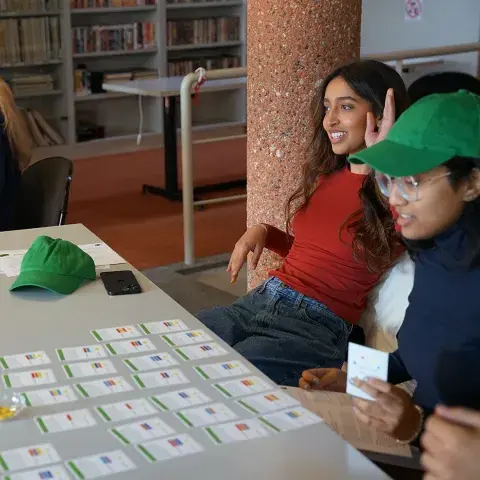
On October 1st, Franklin University Switzerland’s first-year students took part in the postfossilCities Simulation, a highly regarded workshop developed as part of a Swiss National Science Foundation project (NRP73) led by Dr. Patrick Wager (Empa), Prof. Dr. Lorenz Hilty (University of Zurich), and Prof. Dr. Daniel Müller (Norwegian University of Science and Technology), together with the project partners Dr. Markus Ulrich (UCS Ulrich Creative Simulations GmbH) and Prof. Dr. Susanne Kytzia (Eastern Switzerland University of Applied Sciences (OST)).
This year marks a significant milestone for Franklin’s commitment to experiential learning. While our students have previously engaged in this unique curriculum simulation with the help of external facilitators, this is the first time the game has been offered fully independently by our own faculty. This successful transition was made possible after Professors Mario Schultz and Patrick Della Croce completed specialized workshop training, enabling them to independently lead the simulation – an opportunity available to only a select group of Swiss higher education institutions.
An Exclusive Educational Experience
postfossilCities is not a conventional classroom exercise. It is a computer-based simulation created by leading researchers to explore the transformation toward climate-neutral societies. By assigning roles such as policymakers, energy providers, planners, or citizens, the game allows participants to experiment with real-world mitigation measures, test their impact, and negotiate across sectors.
Because the game is normally delivered in carefully facilitated workshops, few universities are granted access to it—making its adoption at Franklin both a privilege and an academic milestone.
Why It Matters for First-Year Students
By embedding postfossilCities in the First Year Seminar curriculum, Franklin introduces new students immediately to the values of collaboration, interdisciplinary problem-solving, and global responsibility. Rather than learning about climate policy only through theory, students were challenged to make decisions under pressure: whether to impose taxes on fossil fuels, promote hydrogen mobility, or expand public transportation.
They quickly realized that no single actor can succeed alone. Collaboration and compromise proved the only way to balance competing priorities and remain within the carbon budget. The experience mirrored the complexities of real climate negotiations while underlining the urgency of collective action.
A Bridge Between Research and Learning
For Franklin, hosting postfossilCities reflects its commitment to connecting liberal arts education with cutting-edge scientific research. For EMPA and the NRP73 program, it highlights the role of higher education in preparing future decision-makers to engage critically with sustainability challenges.
Through this exclusive simulation, Franklin students gained not only an introduction to climate strategy and action but also a powerful insight into the human element of enacting change: that shaping a post-fossil society requires dialogue, creativity, and above all, cooperation.

